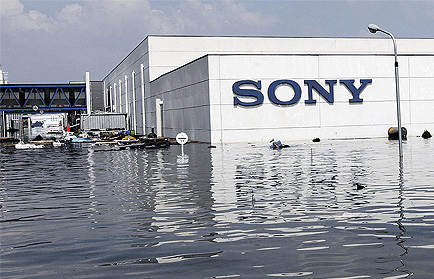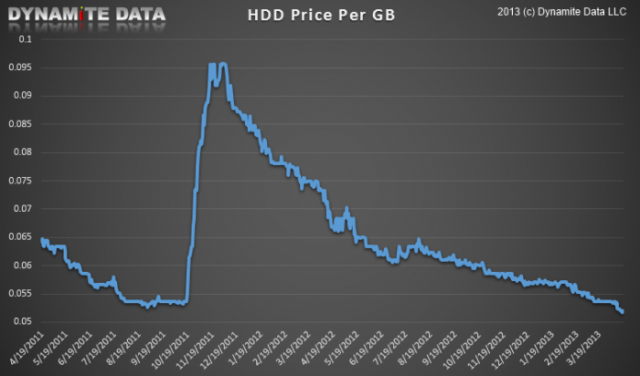HDDs Return to Pre-Flood Prices
If you put off your upgrade plans following the 2011 Thailand Floods, now is a great time to consider expanding your computer or network's storage capabilities.
In addition to killing well over 200 people and displacing millions in the region, the July 2011 floods in Thailand provided some rather dramatic shocks to the storage market with the subsequent drop of production capacity causing delays in shipments, price increases and not coincidentally, strong profits for hard drive manufacturers.
New information from Dynamite Data’s Kris Kubicki and Extreme Tech has revealed some rather promising developments and revealed three distinct trends. Firstly, mechanical hard drive’s dollar per gigabyte prices have returned to pre-flood levels, and secondly, that solid state drive dollar per gigabyte prices are remaining stable and thirdly that SSD storage density has significantly increased.
Before we begin, it is important to note that the data provided is averages from Dynamite Data's database that have been weighted by popularity and thus should provide a more accurate representation of the industry as a whole than using comparing a small basket of products.
1. Mechanical Hard Drive Prices
The floods in July 2011 caused HDD prices to increase 72.7% from $0.055 per GB to $0.095 per GB and as indicated in the above chart, the market has since corrected for this spike by steadily reducing prices back to pre-flood levels. Since prices seem to have reached their current market equilibrium, we don’t expect to see any further price reductions in the near future unless we see the introduction of intervening technologies such as Western Digital’s Helium Hard Drives.
The data also indicates that we cannot reasonably accuse storage manufacturers of price gouging consumers in the aftermath of the flood (retailers and OEMs are a different matter entirely). Rather, it seems that the strong profits registered by manufacturers can instead be attributed to the retiring of less profitable product lines and shift towards drives with smaller, higher density storage platters.
Get Tom's Hardware's best news and in-depth reviews, straight to your inbox.
Tarun Iyer was a contributor for Tom's Hardware who wrote news covering a wide range of technology topics, including processors, graphics cards, cooling systems, and computer peripherals. He also covered tech trends such as the development of adaptive all-in-one PCs.
-
Onus Profits of manufacturers probably also increased because they chopped their warranty lengths, some to as little as one year (Samsung); two years is typical now. Only the WD Black drives still have five year warranties.Reply -
eklipz330 i wonder if another price hike for hdd's will cause the ssd prices to tumble... probably if we're following the standard supply and demand curveReply -
Pherule Reply10701429 said:Profits of manufacturers probably also increased because they chopped their warranty lengths, some to as little as one year (Samsung); two years is typical now. Only the WD Black drives still have five year warranties.
OCZ have 5 year warranties. -
yapchagi nahh it's still not back to pre-flood price. Caviar Black 2 TB is still $160 from amazon. I bought it for $130 last time from amazon.Reply -
Thomas Hock Mushkin Chronos pricing is to SSD as Gskill is to Ram. 240GB gaming SSDs for only $179.99 is such a steal. Hard drives are nearly mapped to my Personal files and backups now these days. Data recovery on a SSD when it fails compared to a HD thats failling is entirely different story. If you SSD stops working you data is GONE! if the hard drive fails there's a lot of easy means of recovering data bit by bit. So as we make a move to SSDs please, please, please backup your data people!Reply -
Soda-88 Reply10701788 said:10701429 said:Profits of manufacturers probably also increased because they chopped their warranty lengths, some to as little as one year (Samsung); two years is typical now. Only the WD Black drives still have five year warranties.
OCZ have 5 year warranties.
OCZ doesn't make HDDs. -
whooleo Last time I checked (this morning) prices are still above pre-flood levels.Reply
Example: Seagate Barracuda 250GB SATA $35 before floods, $60 right now... -
noblerabbit 4TB Seagates, around $140 for your static data, Samsung SSD's for the OS boot. Done!Reply

